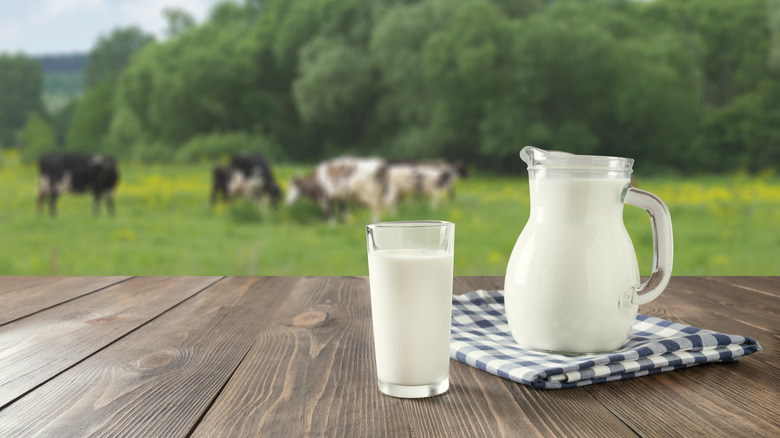Is It Dangerous To Drink Unpasteurized Milk?
While French scientist Louis Pasteur famously originated the process of pasteurization, killing bacteria via high heat, it was German scientist Frans von Soxhlet who was the first to formally propose that the process be applied to milk production (via McGill University). Soon after von Soxhlet's proposal in 1886, the mass pasteurization of milk was adopted, and it is credited with significantly reducing foodborne illnesses.
But despite the public health benefits of milk pasteurization, not everyone is convinced. In fact, the consumption of raw milk has actually gotten more popular in recent years, with celebrities like Gwyneth Paltrow and Martin Sheen espousing the alleged benefits of drinking unpasteurized milk (via Deccan Chronicle).
Supporters say raw milk not only tastes better — it's also better for you. A European study, for example, found that the consumption of unpasteurized milk by children was associated with less asthma and allergy symptoms (via Reuters). However, even those associated with the study say to exercise caution.
"The consumption of raw milk is a double-edged sword," Georg Loss, a researcher with the Swiss Tropical and Public Health Institute, told Reuters. "On the one side it is protective for the development of asthma and allergies, but on the other side it may imply serious health risks due to harmful microorganisms."
The health risks of raw milk
Despite the newfound popularity of raw milk, the Food and Drug Administration maintains that it a serious health risk. According to the Centers for Disease Control and Prevention (CDC), while anyone can get sick from drinking raw milk, the potential harmful bacteria found in milk that has not been pasteurized is most threatening to people with weakened immune systems, infants, children, the elderly, and pregnant women. In fact, the FDA stresses that pregnant women are particularly susceptible to becoming sick from Listeria, a bacteria often present in raw milk that can cause miscarriage, serious illness, or even death of the newborn.
Symptoms of food poisoning from drinking raw milk include vomiting, diarrhea, stomach pain, chills, and fever. While those who get sick from raw milk will likely recover, the FDA notes that some people have developed severe, chronic, or life-threatening conditions.
The FDA also addressed some common misconceptions about pasteurized milk, including the fact that pasteurized milk does not cause allergic reactions or lactose intolerance and that pasteurization does not lower the nutritional value of milk.
In addition to warning about the drinking of unpasteurized milk, the CDC notes that products made from raw milk, including cheese, yogurt, and ice cream, can also cause serious illness.

